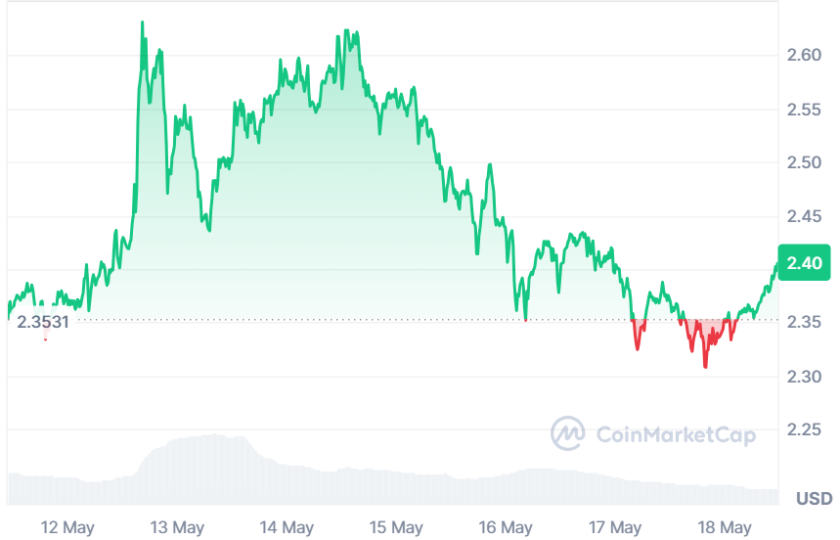While being a relatively young correction to energy-intensive proof-of-work (PoW) network validation, proof-of-stake has existed in theory since 2012. However, rising market cap of PoS tokens like Cardano (ADA) and Tezos (XTZ) over the past two years and Ethereum’s much-hyped but much-delayed shift from PoW to PoS have brought the subject to the forefront.
Alongside an overall increase in regulatory attention on crypto generally, PoS protocols are an area of much debate. One question highlighted by a recent letter from several Congresspeople to the IRS is taxes. Specifically, the letter voiced worries about overtaxing staking rewards.
Unfortunately, the IRS is really treading in new territory, so it’s not a surprise that they have yet to put together comprehensive guidance on staking rewards. Congressman David Schweikert (R-AZ), whose office sent the letter to the IRS, told Cointelegraph that the main task was “just trying to get it on their radar.” He continued:
“We know they have some very smart people over there working on those issues. We’re letting them know that there are those in Congress interested.”
As Cointelegraph has noted in the past, educating the IRS is complicated. Staking is no exception.
Staking rewards and the question of earnings
Explained briefly, PoS replaces PoW’s dependence on hardware with commitment to the network. A Bitcoin miner in 2020 needs to buy fleets of ASIC machines and scour the globe for cheap electricity sources to have a real chance at turning a profit in the cryptographic arms race. PoS puts forward a more utopian vision of contributors validating the network by demonstrating their continued investment in it.
Obviously, the PoW v. PoS debate is more complicated than that. Issues like 51% attacks or domination of PoS networks by the earliest pioneers come up. Nonetheless, as a means of running a network it’s a vital and evolving technology. When it comes to taxes, however, it’s mostly unmapped territory.
The argument that the recent letter to the IRS depends on is this: If you stake tokens most networks reward you with tokens. Tax authorities like the IRS might be tempted to regard these rewards as income, as if those rewards were returns on a stock investment. That, however, assumes a lot about the stability of token prices on a PoS network, especially given that staking itself limits liquidity, so the staker is not able to respond to short-term price movements.
PoSA and defense of staking in the face of dilution
The Proof of Stake Alliance (POSA) is an advocacy group that focuses on issues most pressing to PoS networks. The POSA also helped with the letter to the IRS. Evan Weiss is the founder of POSA, in addition to being Bison Trails’ head of business operations. Speaking to Cointelegraph, Weiss commented on the distinction between mining and staking:
“With mining, token ownership and security of the network are divorced, but in proof-of-stake networks token holders have to help secure these networks. And so these rewards affect nearly every token holder now. It is such a tax headache.”
Providing the intellectual framework to the POSA’s work is Abraham Sutherland, an adjunct law professor at the University of Virginia. In a paper published this week in Tax Notes, Sutherland and co-author Mattia Landoni of the Federal Reserve Bank of Boston wrote of the dangers of dilution. They argue that staking increases tokens but not the network’s overall value:
“Cryptocurrencies consist of several tokens (units of accounting) in a network. If one accepts the uncontroversial premise that the value of a cryptocurrency network does not depend on the exact number of tokens it contains, then the creation of new cryptocurrency units results in dilution. Unlike random fluctuations in network value, which can give rise to both capital gains and losses, this dilution is sure to happen and sure to be detrimental to the taxpayer’s wealth.”
Speaking with Cointelegraph, Sutherland explained the misconception of profiting from staking further:
“The simple model is what if everybody stakes their tokens? Then you basically have the same thing as a pro-rata stock dividend or even just a stock split, which, of course, is not taxed because there’s no gain there.”
Refining and expanding definitions
Sutherland took issue with the IRS’s implication of protocols that back tokens in the profit or lack thereof of stakeholders:
“There’s kind of an assumption supported by the way the IRS looked at this in 2014 that these protocols are entities capable of making payments to people, but they’re not. For tax purposes, they’re not corporations and they’re not doing anything as an actor in the traditional sense.”
The question of protocols as legal entities relates to the ongoing debate over which tokens qualify as securities i.e. investments in a company. Without clear policy from the IRS, taxpayers concerned about stringent crackdowns are left treating returns from decentralized protocols like those from the stock market.
Rather than the stock market, some people say the best analogy for staking is produce. If you have an apple tree on your property, the IRS can’t tax you for apples growing on it, nor can they demand a slice out of every apple pie you make for personal consumption. They can, however, tax you if you bring your apples to market to sell. That seems to be POSA’s point as well: The moment of sale for another currency is a clear and convenient taxable event for tokens earned through staking.
Chandan Lodha, a co-founder of crypto tax software Cointracker, told Cointelegraph that existing guidance just doesn’t include the range of active cryptocurrencies, meaning that regulators are stuck trying to apply creaky analogies, like those of apples or stocks. He said:
“As the industry matures, we need more specific guidance on how different emerging areas of cryptocurrency are taxed (e.g. staking) and legislation more explicitly defining how these taxes should work on cryptocurrencies — either by creating a new definition of what cryptocurrencies are, or by having more specific rules based on the type / use case of the cryptocurrency.”
Shehan Chandrasekera, Cointracker’s head of tax strategy, advised caution in the meantime: “In the absence of IRS guidance, what taxpayers can do is take the most conservative approach, which is recognizing income at the time you receive it.”
Nonetheless, it’s clear that the IRS is paying ever-closer attention to crypto. Spurred on by legislators, something’s got to give.




